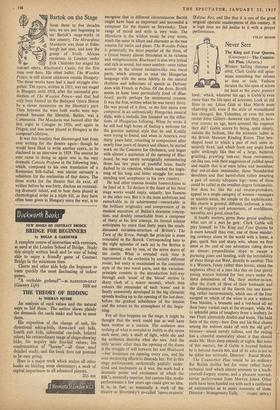Bartok on the Stage
SOME three to five decades late, we are just beginning to see BartOk's stage-works in this country. The Miraculous Mandarin was done at Edin- burgh last year, and now the
group of South African musicians in London under Erik Chisholm has staged his one-act opera, Bluebeard's Castle, for the first time over here. His other ballet, The Wooden Prince, is still almost unknown outside Hungary. The three works have had a hard struggle alto- gether. The opera, written in 1911, was not staged in Hungary until 1918, after the successful pro- duction of The Wooden Prince—and that had only been foisted on the Budapest Opera House by a clever manoeuvre on the librettist's part. Then between the wars both works were sup- pressed because the librettist, Baldzs, was a Communist. The Mandarin was banned after the first night in Cologne in 1926, and again in Prague, and was never played in Hungary in the composer's lifetime.
It was this hostility that discouraged him from ever writing for the theatre again—though he would have liked to write another opera, as he disclosed in an interview in 1929. The nearest he ever came to doing so again was in the very dramatic Cantata Profana in the following year, which, composed to his own translation of a Rumanian folk-ballad, was almost certainly a substitute for the realisation of that desire. The three works for the theatre that do exist, all written before he was forty, disclose an outstand- ing dramatic talent, and to hear them played in chronological order in a triple bill, as they have often been given in Hungary since the war, is to recognise that in different circumstances Bart6k might have been as important and successful a
composer for the theatre as Stravinsky. Their range of mood and style is very wide. The Mandarin is the wildest music he ever wrote, much the same in idiom and character as the two sonatas for violin and piano. The Wooden Prince is potentially the most popular of the three, of a lyrical beauty almost Straussian in its richness and voluptuousness. Blueheard is also very lyrical and rich in sound, but more sombre—even rather austere in the almost recitative-like two vocal parts, which attempt to treat the Hungarian language with the same fidelity to the natural rhythms and inflections of speech as Debussy does with French in Pelleas. Of the three, Bart6k seems to have been particularly fond of Blue- beard, partly perhaps for sentimental reasons. It was the first, written when he was barely thirty. He was proud of it then, as the first opera ever composed in an authentically Hungarian musical style, with a melodic line founded on the inflec- tions of Hungarian folksong. When he wrote it he still had high hopes of finding a welcome for the genuine national style that he and Kodaly were trying to found, and when in America over thirty years later, returning to composition after nearly four years of despair and silence, he started work on the Concerto for Orchestra, and began with almost a quotation of the opening of Blue- beard, he was surely nostalgically remembering those last few years of youthful hope, finally dashed by its rejection, which marked the begin- ning of his long and bitter struggle for under- standing and acceptance in his own country.
He had other reasons besides homesickness to be fond of it. To declare it the finest of his three stage works would imply, unjustly, less fineness in the other two. But it is the most ambitious and remarkable in its achievement—remarkable in the brilliant originality and compression of its musical execution of Balazs's dramatic concep- tion, and doubly remarkable from a composer of thirty at his first attempt. Its formal scheme anticipates by more than forty years the much- discussed variation-structure of Britten's The Turn of the Screw, though the principle is more concealed in the Bartok. Corresponding here to the eight episodes of each act in the Britten is the opening, one by one, of the seven doors of the castle. What is revealed each time is represented in the orchestra by entirely different music, but unity is maintained in the consistent style of the two vocal parts, and the variation- principle consists in the introduction half-way through each 'scene' of the 'blood' motive (a sharp clash of a minor second), which then colours the remainder of each 'scene' and is finally extensively developed in the big climactic episode leading up to the opening of the last door, before the gradual subsidence of the tension and the return to the atmosphere of the begin- ning.
For all that happens on the stage, it might be thought that the work could just as well have been written as a cantata. The audience sees nothing of what is revealed to Judith as she opens each door, only a shaft of light, while she and the orchestra describe what she sees. And the only 'action' other than the opening of the doors is the struggle of will between her and Bluebeard —her insistence on opening every one, and his ever-weakening efforts to dissuade her. Yet in this stage performance, orchestrally pitifully under- sized and inadequate as it was, the work had a dramatic power and excitement of which the BBC's musically superior, but cantata-like, studio performances a few years ago could give no idea. It is, in fact, as essentially a work of the theatre as Stravinsky's so-called 'opera-oratorio' Mdipus Rex, and like that it is one of the great original operatic masterpieces of this century. It is high time we did justice to it with a proper performance.
['OLIN MASON


































 Previous page
Previous page